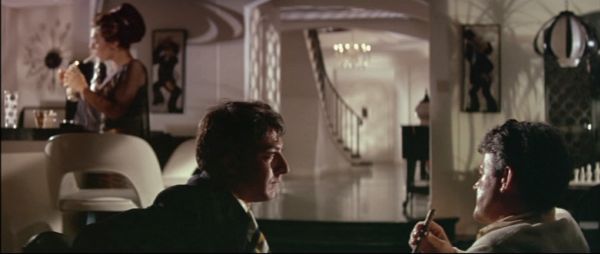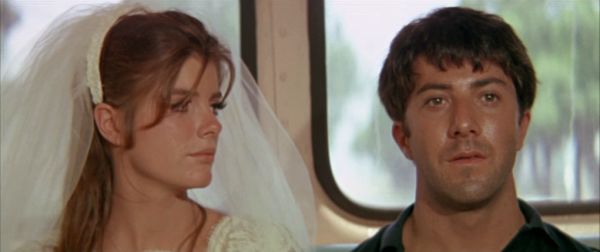The Graduate (Mike Nichols, 1967)
There are few films that are so associated with a particular moment in time as The Graduate. It’s the definitive Hollywood inter-generational sex comedy, but it’s also one of the most important youth pictures of an era defined by the actions of its university-age population. The Graduate was a defining film for the emerging late-sixties youth movement, and the virtues of the film remain clearly apparent nearly forty years later: while it might be dated, its palpable sense of period is also one of its great virtues. (Its wall-to-wall use of Simon & Garfunkel songs as score, for example, is extremely evocative). Yet it remains an intriguing movie precisely because of its association with the political turmoil of the late sixties. It is, ultimately, a deeply cynical film that was adopted by an idealistic generation. Why a film that sees youthful rebellion as futile was so heartily adopted by the late-sixties college crowd remains deeply puzzling.
The film’s appeal to the youth of the day probably derives from its opening set-up. Ben (Dustin Hoffman) has just graduated from university, and his parents and their friends (he appears to have no friends of his own age) hang expectantly on his decision about what he will do next. (“Plastics,” is the piece of one-word advice famously offered by one). Yet he is yearning for something more, something that he can’t define, telling his father simply that he wants his future to be “different.” The film provides a bleak view of the complacent, vacuous middle classes, expressed most clearly through the figure of Mrs Robinson (Anne Bancroft), a bitter and alcoholic friend of Ben’s parents. Listless and weak-willed, Ben is little match for Mrs Robinson when she seduces him, and they start an affair. However, he ultimately turns his back on the corruption of the older generation when he falls in love instead with Mrs Robinson’s daughter Elaine.
The film is masterful in its handling of what at the time was daring subject matter, maintaining a precarious balance between comedy and tragedy. The screenplay was by Calder Willingham and Buck Henry, and it is innovative in the way it reverses our expectations of the material. The thematically darkest, most tragic scenes would seem to be those in which the clearly emotionally damaged Mrs Robinson hones in on Ben, but these are the funniest in the film. Ben is totally ill equipped to deal with either Mrs Robinson’s advances or the logistics of adultery – when he goes to get a room, for example, he is unable to bring himself to reserve a double bed – and his discomfort is exploited in delicious detail. By contrast, when Ben makes the apparently healthy choice to break-off the affair and pursue Elaine Robinson instead, the humour largely dries up and the tone becomes disconcertingly bleak. The courtship sequences that might normally be treated as light comedy are really quite disturbing, with Ben’s behaviour becoming erratic and almost creepy.
Just about everyone involved in the film – including Nichols, screenwriters Willingham and Henry, and the cast – became a hot property in Hollywood for the next few years on the strength of this, and deservedly so. Nichols’ direction was at the time extremely innovative, making use of such devices as disconcerting close-ups, quick zooms, extended hand-held tracking shots (such as in the opening party scene), and confronting point-of-view shots (including one, as Ben wears a scuba diving costume, that lasts well over a minute). These conspicuously gimmicky moments are not always effective – the diving scene, in which Ben is made to wear the costume and then pushed under the water by his parents, is a fairly laboured and obvious visual metaphor – but Nichols’ technique is assured in the quieter moments. He uses the wide frame very effectively, giving the actors space to play out their extended scenes of dialogue. The performances are terrific all round, with Hoffman’s star-making performance a stand-out, one of the truly great comic performances (his timing is terrific). Bancroft gives Mrs Robinson a steely edge that allows little room for pity: there is a misogynist undercurrent to the film that is revealed in the almost grotesque way that Mrs Robinson is presented, her tan-lines and waxen features ensuring that the audience retain an analytical distance from the character.
The harsh view of Mrs Robinson might have been rationalised by the youth of the time as condemnation of a corrupt older generation. Yet there are other aspects of the film that must have been harder to reconcile. While the audience might have shared Ben’s disillusionment with a consumerist middle class future, he is not a strong role model for a youth culture that was at the time in the process of defining itself by its political engagement. He is weak, easily manipulated, and at various times treats both the Robinson women badly. While he rejects the career-driven future offered by his parents, he is never able to articulate what it is he wants instead, and his idea of “dropping out” is to have an adulterous affair and mooch off his parents all summer. What is particularly striking seeing the film now is that this doesn’t seem to be any kind of misjudgment by the filmmakers: Nichols really did seem to want to make a film that was dismissive of rebellious youth.

This is most clearly seen in the film’s second half: the set-up might be a counter-cultural anthem, but the resolution is much more problematic. In the latter part of the film, Ben’s urge to reject the values of his parents becomes embodied in his pursuit of Elaine Robinson. (We’re so used to conflict being resolved by romantic conquest in Hollywood films that we don’t necessarily question this, despite the fact that it was Ben’s parents who initially pushed for him to get together with Elaine.) In the memorable final sequence, he races to avert Elaine’s wedding to another man, and when he is locked out of the church bangs on the glass wall at the back until she responds to his cries. It is a classic Hollywood romantic moment, and the pair flee the church together in a triumphant declaration of young love over the will of their parents. Yet Nichols’ staging of their exit is a famous example of a director undermining the superficially apparent meaning of a scene. As Ben and Elaine escape on a passing bus they are at first jubilant, but Nichols mercilessly holds the shot until the smiles fade from the faces to be replaced by doubt, the pair having nothing to say to each other. Ben’s gaze fixes into blankness, Elaine looks at him uncertainly, and Simon & Garfunkel’s “Sound of Silence” (used as a theme expressing Ben’s discontent throughout the film) intrudes, suggesting their escape is an empty gesture. Ben’s attempt to define a different future for himself has been expressed by forging a romantic relationship, but this is, after all, the same path that his and Elaine’s parents took before them. Nichols makes it quite clear that theirs is an ill-judged rebellion that will lead down the same road as their parent’s choices did. (Has a single shot ever been so effective at mapping out the next forty years of a character’s life?)
Nichols is here overtly judgemental of the emptiness of his protagonist, and I’ve never quite made up my mind about how I feel about this aspect of the film. It’s a bleak and dismissive message for the film to carry: it seems rather a defeatist conclusion for a film made at a time of huge social upheaval. On the other hand, subverting the facile “happy ending” is itself something of a challenge to the audience to make their own better future. And it has to be said that Nichols was spot-on: the final moments of the film appear now as an ominous foreshadowing of the way the baby-boomers’ social revolution petered out as, for the most part, they gave-up on changing the world and pursued conventional career and life choices. The irony of all this is that the film probably lives on largely out of nostalgia for a time before this surrender had occurred.
Whatever your views on its ending, however, you can’t get away from the skill of Nichols’ direction, the wonderful performances, the impeccably done comedy, and the perfect skewering of a particular social set and period. That’s enough for any film to get right, and I’ll continue to love The Graduate even while I remain suspicious of its message.
